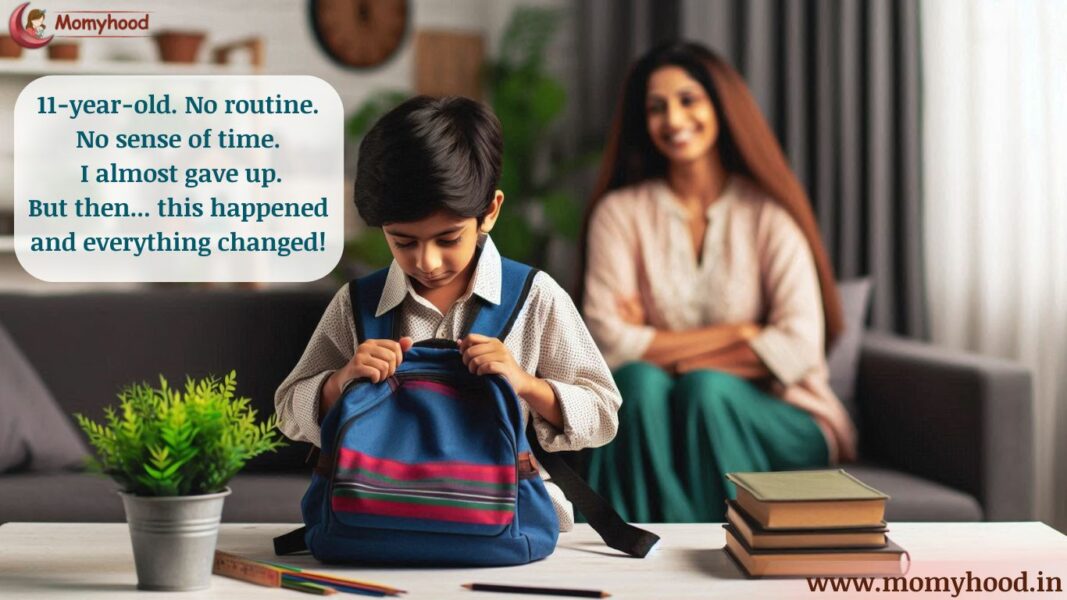I was mentally drained.
Not because of major tantrums.
But because of the daily struggle of reminding my 11-year-old son to do the basics.
-
He wouldn’t oil his body or use moisturiser — even in winter
-
He’d forget his school water bottle, lunch, homework
-
And he couldn’t say “No” — even if it meant breaking his own rules
And it wasn’t just one thing.
He would:
-
Forget personal care completely
-
Leave for school without checking his bag
-
Get distracted by friends easily
-
Struggle to say “no” when it was needed
-
And… never ever take initiative unless pushed
It wasn’t just forgetfulness — it was a total lack of self-discipline.
And I was tired of sounding like a nag all day long.
I tried everything — gentle reminders, explaining, even shouting out of frustration. But nothing made a lasting difference.
But today, he’s 13 — and handles 90% of his routine himself.
No reminders. No bribes. No shouting.
How did that happen? Here’s the story — and the exact steps that worked.
📣 Loved what you read? Want to go deeper into conscious parenting? ✨ The Power of Manifestation in Parenting is now available — A soulful guide packed with real-life tools like affirmations, energy shifts, and sleep talk that I personally use with my son, Hitarth. 💛 Start your journey toward calmer, connected parenting today. 🎉 Launch Offer: Only ₹99 (limited-time price!) 📲 Instant download. No waiting. 👉 Grab your copy now!.
What I Realised (And You Might Too)
I was trying to control every little thing — which actually made him more dependent.
He wasn’t learning responsibility. He was just following instructions (when he felt like it).
And honestly — even I wouldn’t want someone micromanaging me like that.
So I changed my parenting approach.
What I Did Differently (With Real Examples)
1. Let Natural Consequences Be the Teacher
Earlier, I would rush behind him:
“Did you pack your tiffin?”
“Here, take this money!”
“Don’t forget your ID card!”
One day I just… stopped. Instead of reminding him daily to carry lunch or water…
I stopped rescuing.
One day he forgot his lunch & lunch money too. I didn’t hand-deliver it to school. He shared lunch with a friend. Came home quiet.
I simply said,
“It’s okay. It happens. I’m sure you’ll remember next time.”
And guess what? He did.
Another time, he left his sports shoes at home. He missed P.E. that day — came home upset. But since then, he checks his bag every night.
✅ Tip for parents: Let kids experience the real-world outcome. It sticks way more than lectures.
2. Introduced Habits One at a Time
I used to expect everything at once: brushing, body lotion, bag prep, playtime control.
That overwhelmed him.
So we slowed down:
Week-by-week habit layering:
-
Week 1: Focus on brushing and face wash
-
Week 2: Add lotion after bath
-
Week 3: Practice night-time bag check
-
Week 4: Introduce time-based play limits
It made self-care feel doable, not burdensome. We took it slow and layered, but by week 5, he was doing 4 things daily without reminders.
3. Created a Fun “My Morning Routine” Chart — Designed by Him
Instead of making another “Mom-made” checklist, I gave him full control.
We made a DIY board where he:
-
Drew his tasks
-
Added checkboxes
-
Decorated with stickers
Each morning, he used a whiteboard marker to tick off his routine.
I didn’t even remind him to check it — the board was his reminder.
✅ Parenting hack: Ownership creates natural motivation.
After 3–4 days of missing moisturizer and forgetting socks, he started checking that chart before I even got out of bed.
4. Taught Him to Say “No” Without Guilt
One huge issue was saying no to friends.
If someone rang the doorbell 10 minutes after playtime was over, he’d invite them in — even if I had said “done for today.” And one day, a neighbour once rang the bell at 9 PM to return something. He casually asked, “Want to come down for 10 minutes?” And without blinking, he ran to wear slippers and head out — even though we had already started our bedtime routine.
So we role-played how to handle such moments:
-
“I’ve played enough today, let’s meet tomorrow.”
-
“Sorry, I can’t today — I’ve got to finish homework.”
-
“My screen time is over now, maybe later?”
We played both sides of the scene — I made it fun and dramatic.
One day, a boy did show up late.
And my son calmly said,
“I’d love to play, but my time’s up. Let’s meet tomorrow.”
✅ Lesson: Assertiveness is a life skill. Kids need to practice it like they practice tying shoelaces.
5. Praised Small Wins, Ignored Small Misses
I shifted focus from pointing out mistakes to spotting the efforts.
Even if he remembered just one thing:
“You packed your bottle without me saying — awesome!”
I didn’t taunt if he missed a step.
I knew consistency would take time.
Soon, he started correcting himself:
“Oops, I forgot to lotion. Doing it now.”
That shift — from me noticing to him noticing — was a big win.
What I Did In Addition: I Started Believing in Manifestation
Everything I shared above — the checklists, consequences, role-plays — helped.
But honestly? I believe what made the deepest shift was something less visible, but more powerful:
I started manifesting the version of my son I wished to see.
No, I didn’t sit for hours doing rituals.
I simply started to believe. To see him in my mind the way I wanted him to be — calm, responsible, independent, and in love with taking care of himself.
Every night before sleeping, I’d close my eyes and picture:
-
Him standing confidently in front of the mirror, applying moisturizer on his own
-
Packing his school bag neatly and zipping it up
-
Saying “No” to a friend without guilt
-
Smiling with pride after completing his checklist
I didn’t obsess over when it would happen. I just believed that it already was.
I even started using simple affirmations silently:
“He is growing responsible every day.”
“He enjoys taking care of himself.”
“He handles his things with confidence.”
“He is calm, focused, and aware of his time.”
Some nights, I whispered these while gently brushing his hair when he slept — sleep talk style.
And the more I believed it, the more peaceful I became — and the more aligned he became too.
Was it magic?
Not really.
It was energy.
He mirrored what I started to believe about him.
Where We Are Now (13-Year Update)
No, he’s not a flawless robot.
But now he:
-
Packs his school bag at night
-
Manages his grooming without reminders
-
Sets playtime boundaries himself
-
And even reminds me when I forget things!
More importantly — he feels proud of being responsible.
What changed?
Honestly — I changed.
-
I stopped trying to fix everything at once.
-
I gave him room to mess up — and learn.
-
I shifted from nagging to noticing.
-
I respected his learning pace, even when it was slower than I wanted.
Parenting this phase is tricky. They’re not little, but not teens either.
They want freedom, but they need structure.
They push us away, yet expect us to rescue them.
I had to learn how to be there without being everywhere.
And slowly… we both found peace.
💬 Final Words for Every Tired Mom Out There
If your child is careless, forgetful, unbothered by self-care — you’re not alone.
You’re not doing anything wrong.
✅ You’re not failing.
✅ They’re not broken.
✅ It just takes time, patience, and a different kind of support.
These are not signs of a spoiled or lazy child.
They’re signs of a child who hasn’t been taught to own their routine — yet.
Start with:
-
One habit
-
One consequence
-
One moment of praise
And trust me — your child will slowly rise into their responsibility. You don’t need to control — you just need to coach.
Just like mine did.
Love,
A once-exhausted mom who now watches from the sidelines (mostly!)
Your comments and shares do more than just support our blog—they uplift the amazing moms who share their stories here. Please scroll down to the end of the page to leave your thoughts, and use the buttons just below this line to share. Your support makes a big difference!



